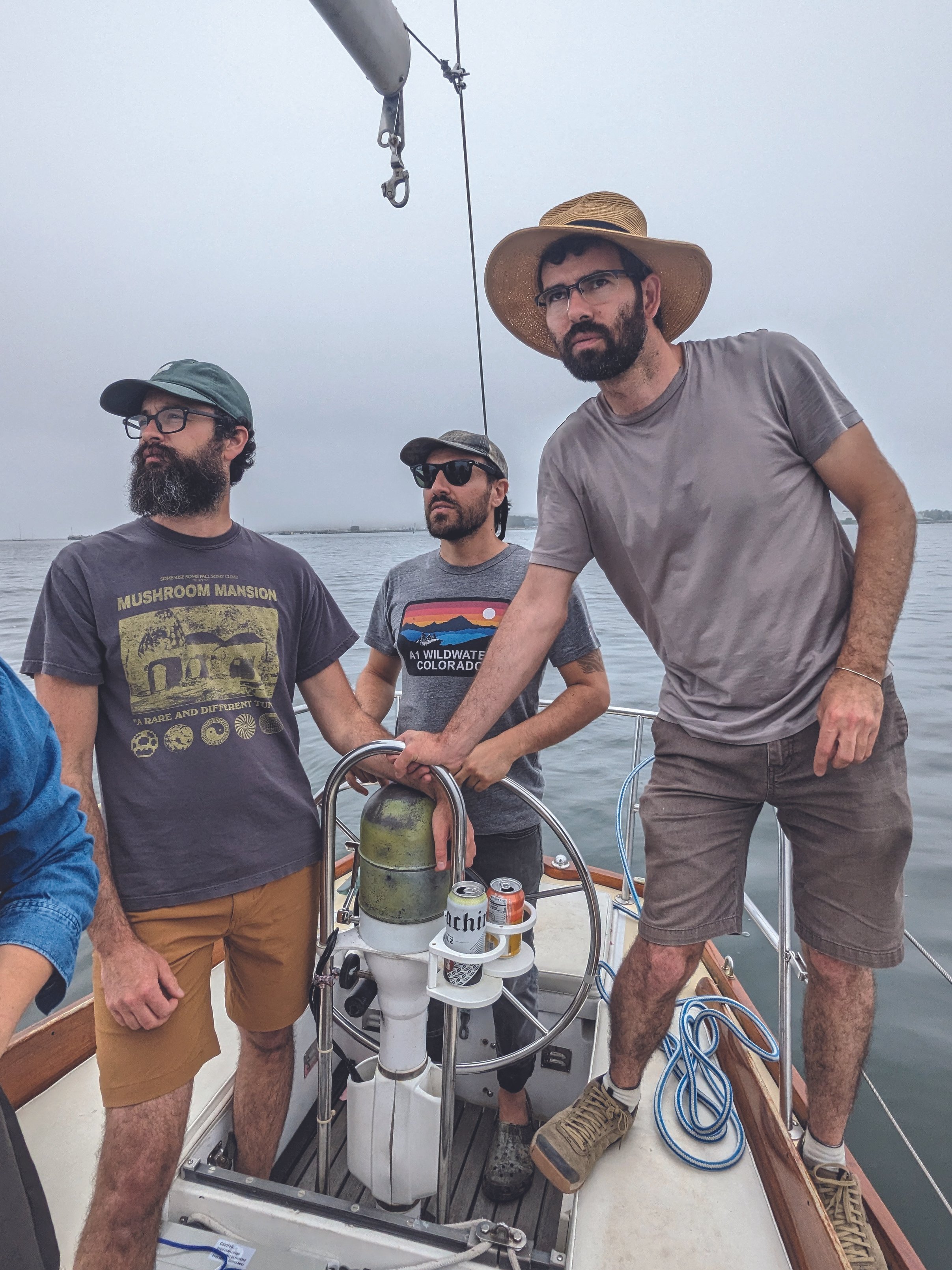Matt McInnis ’09, Jon Carver ’09, and Eliah Thanhauser ’09
Good morels: North Spore
Jon, Matt, and Eliah sailing; photo by Avi Fox.
By Kiera O’Brien ’18
When friends Matt McInnis, Jon Carver, and Eliah Thanhauser, all class of ’09, hatched a plan to start a mushroom farm in 2014, they weren’t sure where the idea would lead. “We had all taken different paths after COA,” says McInnis. “Eliah had been managing organic farms, I was freelancing as a photojournalist, and Jon completed a master's in mycology. But eventually we each found our way back to Maine.”
Putting their heads together over a few glasses of wine at a small Portland cafe, the friends considered their overlapping interests and divergent capabilities. “We figured out which pieces of our very different skill sets could work synergistically together,” explains McInnis. They found common ground in fungi.
“We rented the cheapest commercial space we could find on Craigslist—it was basically a shack, it didn’t have a sink, hardly had electricity—and we turned it into a little mushroom growing operation where we grew edible oyster mushrooms in five-gallon buckets,” continues McInnis. “We sold the oyster mushrooms to local Portland restaurants, and that’s how we started.” They named their nascent operation North Spore.
For Carver, co-founding a business with McInnis and Thanhauser was driven by a collaborative impulse rather than entrepreneurial ambitions. “We stumbled into it. More than anything, I think we wanted to stay connected and create something exciting in the world together,” he says. Thanhauser agrees: “We wanted to build a community like the one we had all found at COA, to continue learning with and from each other.”
“At the time, I figured North Spore was a cool summer project, or maybe a yearlong thing,” McInnis shares with a laugh. “I didn’t think it was a 10-year plan!” A decade later, North Spore has become one of the USA’s largest suppliers of mushroom-growing equipment and is an industry leader in the field of mushroom cultivation and research. With a team of more than 70 employees and a mission to “make the world of mushroom cultivation accessible to all,” North Spore operates on a vertically-integrated model, meaning that all of their mushroom spawn—the equivalent of seed for mushroom growers—is cultivated in-house. While the vertically-integrated approach has been part of their model since day one, the five-gallon buckets are long gone. Thanhauser, who oversaw the construction efforts, is especially proud to share that the company now operates a state-of-the-art mycology laboratory, housed within North Spore’s very own 25,000-square- foot production and fulfillment facility in Portland.
The co-founders’ shared commitment to collaboration and education has proven integral to the company’s success. “Since the beginning, education has been a hallmark of what we do at North Spore,” says Carver. “After completing my master’s in mycology, I realized that I could spend many more years in school to become an expert within one very specific aspect of the field. But that felt too slow, too narrow. There’s so much to explore in the field of mycology—which is still very much in its infancy in many ways. I wanted to create something that facilitated a broader approach to research.”
This ethos, cultivated in all three co-founders during their time at COA, fuels North Spore’s innovative mission to meld business, education, and community-driven research. “Everything we do at North Spore is about forging a path for people to engage with mushrooms,” elaborates McInnis, now the company’s creative director. Not only does North Spore create a broad swath of digital educational content aimed at empowering people to grow their own edible and medicinal mushrooms, but it also facilitates a research partnership program, led by Carver, who serves as the company’s lead mycologist. The program provides resources and “materials to aspiring researchers, gardeners, farmers, and individuals with mycological inquiries.” In exchange, says Carver, “North Spore shares our research partners' discoveries with our broader community, all in the service of expanding the collective knowledge base around mushrooms.”
Reflecting on what makes their decade-long collaboration tick, Thanhauser, now company CEO, points to a deep willingness to “change one another’s minds, to disagree with one another, and then to find a solution that we couldn’t have figured out alone.” Carver concurs: “I can't imagine ever getting to this point without it being the three of us.” McInnis picks up the thread. “We’ve learned how to come to consensus through conversations that are never dogmatic but are all about valuing other perspectives.” After a pause he concludes: “It’s our interpretation of human ecology in practice. And that extends beyond the three of us. It’s reflected in everything North Spore has accomplished.”

